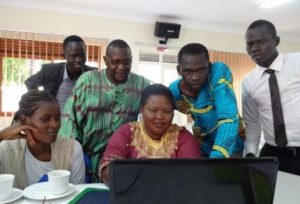FREE FLOW OF INFORMATION
An article from Togo Presse (translated by CPNN)
Some 50 journalists from Catholic media and secular media from the seven dioceses of Togo took part, on Tuesday and Wednesday (21-22 August), in CESAL, in Lomé-Tokoin, in a training workshop on the theme: “The media at the service of dialogue, reconciliation and peace”. The project is in the hands of the Catholic Episcopal Council for Social Communications (CENCCS), in partnership with the World Catholic Association for Communication (SIGNIS), the Propaganda Fide, with the sponsorship of the Conference of Bishops of Togo (CET) ). It aims to strengthen the capacity of media professionals to contribute to the success of inter-Togolese dialogue, national reconciliation and the consolidation of social peace.

Emmanuel Mawusi, clarifies the objectives of the workshop
The essential functions of a media is to inform, educate and entertain. As such, in a process of dialogue and reconciliation, as is the case in Togo, which is going through a momentous moment in its history, the media must be mediators between the protagonists of the crisis. But it is clear that the Togolese press, for the most part, ignores this role, preferring to play the game of politics. It is therefore to remind them of this role of awakeners of conscience that the Catholic Episcopal Council for Social Communications (CENCCS) initiated, for the pastoral agents of the sector of Catholic media and secular media of the seven dioceses of Togo , a workshop on the theme: “Media for Dialogue, Reconciliation and Peace”.
(continued in right column)
African journalism and the Culture of Peace, A model for the rest of the world?
(continued from left column)
For two days, seasoned speakers spoke on several sub-themes namely “Dialogue in the management of a political crisis: the case of Togo”, “Reconciliation in traditional and contemporary societies”, “Promotion of culture of peace: the role of the media professionals “, “The role of the media in a process of dialogue and reconciliation”and “Exchanges on the use of traditional and contemporary techniques of production of media content in favor of ‘peace journalism”.
“We want that, starting from here, we can act as we should with great circumspection by using the words and doing the right thing to really help the Togolese to reconcile, to know how to manage the moments of crisis. Words have strength. By speech or a statement, people can be manipulated based on what is said. So, as media professionals, we hold the very crux of the crisis in this country. When there is a crisis without dialogue, we go to the impasse. We are here to teach Togolese to stay together while being on various sides,” said Rev. Emmanuel Mawusi, Secretary General of CENCCS.
For Daniel Lawson Drakey, one of the communicators, the journalist, as an educator and awakener of conscience, must make a difference. The journalist should be at the disposal of the population wherever there is an issue without taking a stand. “It’s about not throwing oil on the fire. Today we have the impression that journalists have become political actors. They speak in the place of the politician. This makes us no longer understand the role of the media within the populations. Combat journalism has had its day. Today, everyone is talking about the development of our states. When a journalist engages politically, he loses credibility. But if it becomes independent, the people find in it a credibility and they listen to it,